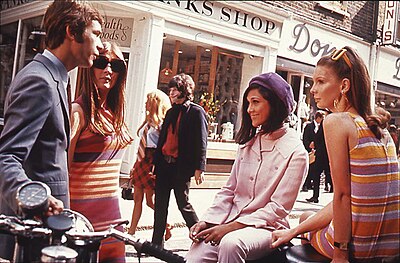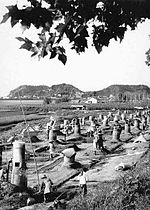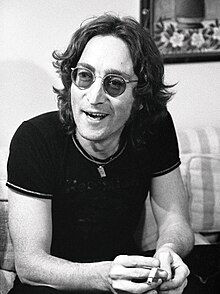Portal:1960s
The 1960s Portal
The 1960s became synonymous with the new, radical, and subversive events and trends of the period. In Africa the 1960s was a period of radical political change as 32 countries gained independence from their European colonial rulers. Some commentators have seen in this era a classical Jungian nightmare cycle, where a rigid culture, unable to contain the demands for greater individual freedom, broke free of the social constraints of the previous age through extreme deviation from the norm. Christopher Booker charts the rise, success, fall/nightmare and explosion in the London scene of the 1960s. However, this alone does not explain the mass nature of the phenomenon. Several nations such as the U.S., France, Germany and Britain turned to the left in the early and mid 1960s. In the United States, John F. Kennedy, a Keynesian and staunch anti-communist, pushed for social reforms. His assassination in 1963 was a stunning shock. Liberal reforms were finally passed under Lyndon B. Johnson including civil rights for African Americans and healthcare for the elderly and the poor. Despite his large-scale Great Society programs, Johnson was increasingly reviled by the New Left at home and abroad. The heavy-handed American role in the Vietnam War outraged student protestors across the globe, as they found peasant rebellion typified by Ho Chi Minh and Che Guevara more appealing. Italy formed its first left-of-center government in March 1962 with a coalition of Christian Democrats, Social Democrats, and moderate Republicans. Socialists joined the ruling block in December 1963. In Britain, the Labour Party gained power in 1964. In Brazil, João Goulart became president after Jânio Quadros resigned. This is a Featured article, which represents some of the best content on English Wikipedia..
The 1962 Tour de France was the 49th edition of the Tour de France, one of cycling's Grand Tours. The 4,274-kilometre (2,656 mi) race consisted of 22 stages, including two split stages, starting in Nancy on 24 June and finishing at the Parc des Princes in Paris on 15 July. There were four time trial stages and no rest days. After more than 30 years, the Tour was again contested by trade teams instead of national teams. Jacques Anquetil of the Saint-Raphaël–Helyett–Hutchinson team won the overall general classification, defending his title to win his third Tour de France. Jef Planckaert (Flandria–Faema–Clément) placed second, 4 min 59 s in arrears, and Raymond Poulidor (Mercier–BP–Hutchinson) was third, over ten minutes behind Anquetil. Anquetil's teammate Rudi Altig took the first general classification leader's yellow jersey after winning the first stage. He lost it the following day to André Darrigade of Gitane–Leroux–Dunlop–R. Geminiani, who won stage 2a, before regaining it after winning stage three. The lead was taken by Saint-Raphaël rider Albertus Geldermans after stage six. He held it for two stages, before Darrigade took it back for the next two. Flandria rider Willy Schroeders then led the race between the end of stage nine to the end of eleven, at which point Schroeders' teammate Rik Van Looy, a major pre-race favourite, abandoned the race with an injury. The following day, British rider Tom Simpson (Gitane–Leroux) became the first rider from outside mainland Europe in history to wear the yellow jersey. He lost it to Planckaert after stage thirteen's individual time trial to Superbagnères in the Pyrenees. He held the lead for seven stages, which included the Alps. Anquetil's victory in the individual time trial of stage twenty put him in the yellow jersey, which he held until the conclusion of the race. (Full article...) This is a Good article, an article that meets a core set of high editorial standards.
On October 31, 1963, a gas explosion occurred at the Indiana State Fairgrounds Coliseum in Indianapolis, United States, killing 81 people and injuring about 400 others. It was one of the worst disasters in the history of the state. On the night of October 31, over 4,000 people were in the coliseum to watch a Holiday on Ice performance. While this was happening, liquefied petroleum gas was leaking from a tank that was stored with several others in a supply room underneath a part of the grandstands. Shortly after 11 p.m. ET, the gas came into contact with an electrical heating element from the concessions area, causing a major explosion that killed many seated above the room and caused significant damage to the stands. After the initial blast, while people were evacuating, a second blast caused by the remaining, unexploded tanks resulted in further destruction. Firefighters and other emergency responders were at the site within minutes and survivors were transported via ambulance to various hospitals in the area. The gas tanks were discovered by firefighters during cleanup operations and later testing revealed that they were the cause of the explosion. (Full article...) Selected picture - In the 1960s, Carnaby Street in London was the center for trends and fashions.
Did you know -
Related portalsThis is a Featured article, which represents some of the best content on English Wikipedia..
John Winston Ono Lennon (born John Winston Lennon; 9 October 1940 – 8 December 1980) was an English singer-songwriter, musician and political activist. After a troubled childhood, he gained worldwide fame as the founder, co-lead vocalist and rhythm guitarist of the Beatles. His songwriting partnership with Paul McCartney remains the most successful in history. Born in Liverpool, Lennon became involved in the skiffle craze as a teenager. In 1956, he formed the Quarrymen, which evolved into the Beatles in 1960. Lennon initially was the group's de facto leader, a role he gradually seemed to cede to McCartney. Through his songwriting in the Beatles, he embraced myriad musical influences, initially writing and co-writing rock and pop-orientated hit songs in the band's early years, then later incorporating experimental elements into his compositions in the latter half of the Beatles' career as his songs became known for their increasing innovation. Lennon soon expanded his work into other media by participating in numerous films, including How I Won the War, and authoring In His Own Write and A Spaniard in the Works, both collections of nonsense writings and line drawings. Starting with "All You Need Is Love", his songs were adopted as anthems by the anti-war movement and the counterculture of the 1960s. (Full article...) This is a Good article, an article that meets a core set of high editorial standards.
Ravi Shankar (Bengali pronunciation: [ˈrobi ˈʃɔŋkor]; born Robindro Shaunkor Chowdhury, sometimes spelled as Rabindra Shankar Chowdhury; 7 April 1920 – 11 December 2012) was an Indian sitarist and composer. A sitar virtuoso, he became the world's best-known expert of Indian classical music (in Sitar) in the second half of the 20th century, and influenced many musicians in India and throughout the world. Shankar was awarded India's highest civilian honour, the Bharat Ratna, in 1999. He is also the father of American singer Norah Jones. Shankar was born to a Bengali family in India, and spent his youth as a dancer touring India and Europe with the dance group of his brother Uday Shankar. At age 18, he gave up dancing to pursue a career in music, studying the sitar for seven years under court musician Allauddin Khan. After finishing his studies in 1944, Shankar worked as a composer, creating the music for the Apu Trilogy by Satyajit Ray, and was music director of All India Radio, New Delhi, from 1949 to 1956. He was nominated for the Academy Award for Best Original Score for scoring the blockbuster Gandhi (1982). (Full article...) Selected article -Second-wave feminism was a period of feminist activity that began in the early 1960s and lasted roughly two decades, ending with the feminist sex wars in the early 1980s and being replaced by third-wave feminism in the early 1990s. It occurred throughout the Western world and aimed to increase women's equality by building on the feminist gains of the late 19th and early 20th centuries. Second-wave feminism built on first-wave feminism and broadened the scope of debate to include a wider range of issues: sexuality, family, domesticity, the workplace, reproductive rights, de facto inequalities, and official legal inequalities. First-wave feminism typically advocated for formal equality and second-wave feminism advocated for substantive equality. It was a movement focused on critiquing patriarchal or male-dominated institutions and cultural practices throughout society. Second-wave feminism also brought attention to issues of domestic violence and marital rape, created rape crisis centers and women's shelters, and brought about changes in custody law and divorce law. Feminist-owned bookstores, credit unions, and restaurants were among the key meeting spaces and economic engines of the movement. (Full article...) More Did you know (auto generated)
TopicsCategoriesWikiProjects
Associated WikimediaThe following Wikimedia Foundation sister projects provide more on this subject:
Discover Wikipedia using portals |






























